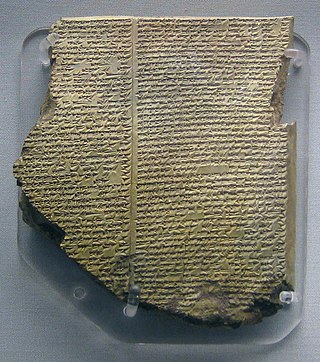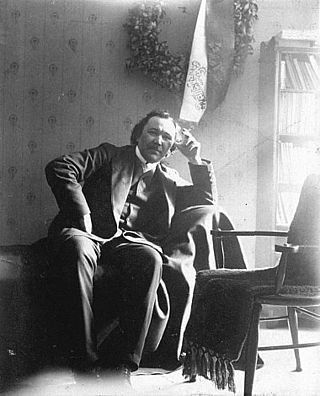
An epic poem, or simply an epic, is a lengthy narrative poem typically about the extraordinary deeds of extraordinary characters who, in dealings with gods or other superhuman forces, gave shape to the mortal universe for their descendants.

Eino Leino was a Finnish poet and journalist who is considered one of the pioneers of Finnish poetry and a national poet of Finland. His poems combine modern and Finnish folk elements. Much of his work is in the style of the Kalevala and folk songs in general. Nature, love, and despair are frequent themes in Leino's work. He is beloved and widely read in Finland today.

This is a list of articles about poetry in a single language or produced by a single nation.

Yevgeny Abramovich Baratynsky was lauded by Alexander Pushkin as the finest Russian elegiac poet. After a long period when his reputation was on the wane, Baratynsky was rediscovered by Russian Symbolism poets as a supreme poet of thought.
Finnish poetry is the poetry from Finland. It is usually written in the Finnish language or Swedish language, but can also include poetry written in Northern Sámi or other Sámi languages. It has its roots in the early folk music of the area, and still has a thriving presence today.

Dritëro Agolli was an Albanian poet, writer and politician. He studied in Leningrad in the Soviet Union, and wrote primarily poetry, but also short stories, essays, plays, and novels. He was head of the League of Writers and Artists of Albania from 1973 until 1992. He was a leading figure in the Albanian Communist nomenklatura.

Anselm Paul Alexis Hollo was a Finnish poet and translator. He lived in the United States from 1967 until his death in January 2013.
Swedish literature refers to literature written in the Swedish language or by writers from Sweden.

A national poet or national bard is a poet held by tradition and popular acclaim to represent the identity, beliefs and principles of a particular national culture. The national poet as culture hero is a long-standing symbol, to be distinguished from successive holders of a bureaucratically-appointed poet-laureate office. The idea and honoring of national poets emerged primarily during Romanticism, as a figure that helped consolidation of the nation states, as it provided validation of their ethno-linguistic groups.

Swedish Romantic literature denotes Swedish literature between 1809 and 1830. In Europe, the period from circa 1805–1840 is known as Romanticism. It was also strongly featured in Sweden, based on German influences. During this relatively short period, there were so many great Swedish poets, that the era is referred to as the Golden Age of Swedish poetry. The period started around 1810 when several periodicals were published that contested the literature of the 18th century. An important society was the Gothic Society (1811), and their periodical Iduna, a romanticised retrospect to Gothicismus.
Nationality words link to articles with information on the nation's poetry or literature.
Nationality words link to articles with information on the nation's poetry or literature.
Marathi poetry is a poetry written in the Marathi language, including its various dialects.
Estonian literature is literature written in the Estonian language The domination of Estonia after the Northern Crusades, from the 13th century to 1918 by Germany, Sweden, and Russia resulted in few early written literary works in the Estonian language. The oldest records of written Estonian date from the 13th century. Originates Livoniae in Chronicle of Henry of Livonia contains Estonian place names, words and fragments of sentences. The Liber Census Daniae (1241) contains Estonian place and family names. The earliest extant samples of connected Estonian are the so-called Kullamaa prayers dating from 1524 and 1528. The first known printed book is a bilingual German-Estonian translation of the Lutheran catechism by S.Wanradt and J. Koell (1535). For the use of priests an Estonian grammar was printed in German in 1637. The New Testament was translated into southern Estonian in 1686. The two dialects were united by Anton Thor Helle in a form based on northern Estonian. Writings in Estonian became more significant in the 19th century during the Estophile Enlightenment Period (1750–1840).
Jukka Koskelainen is a Finnish poet and recipient of the Eino Leino Prize in 1993 along with Jyrki Kiiskinen. They both edited the literary magazine Nuori Voima in the 1990s.

Poetry of Scotland includes all forms of verse written in Brythonic, Latin, Scottish Gaelic, Scots, French, English and Esperanto and any language in which poetry has been written within the boundaries of modern Scotland, or by Scottish people.

Manohar Shetty is a Goa-based poet considered one of the prominent Indian poets writing in the English language.
Nuori Voima is a Finnish literary and cultural magazine which has been published since 1908. It is headquartered in Helsinki, Finland. Both the magazine and its parent organization, Nuoren Voiman Liitto, are among the well-respected institutions in Finland.









